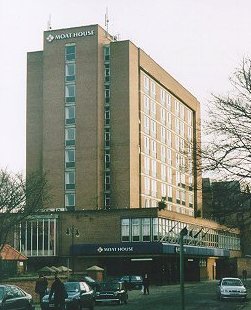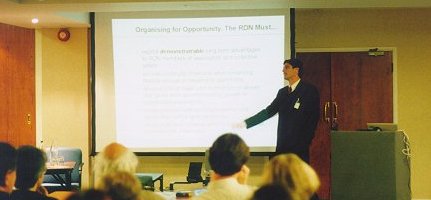Information Ecologies: Report of the eLib Conference

Conference Themes
I arrived late for this eLib conference held at the beginning of December at the Viking Moat House Hotel, York. Because of an incident on the Bristol to York line, I therefore missed the opening keynote address by Jim Michalko. However the main themes of the eLib conference soon became clear. There were three main strands, reflecting both the development of the programme since 1995, and the current preoccupations of the phase three projects. These were:
- preservation issues,
- the development of hybrid library services,
- subject gateways.
Funding Issues
There was a strong focus on practicalities: hence also a good deal of discussion of current funding opportunities (the EU Fifth Framework Telematics Programme; the US/UK NFS/JISC collaboration; etc). Tim Owen discussed the New Library Programme, and the Government’s funding committment, and there were also several presentations on rights issues.
The economics of electronic scholarly publishing was also discussed in a panel session, and another session explored opportunities for university libraries to benefit from the Heritage Lottery Fund. There was also an opportunity to hear the latest information about BLRIC’s transfer of research activity and funding to the Library and Information Commission.
International Outlook
A number of Phase 3 eLib projects were featured in conference sessions, (BUILDER, CEDARS, HERON, etc): however the conference focus was squarely on the issues of international significance which these projects have been funded to address, rather than the projects themselves. There were several speakers from the US: Susan Calcari of the University of Wisconsin-Madison (and the Internet Scout Project), gave a presentation on International subject gateway collaboration; Michael Freeston, Alexandria Digital Library Project, University of California (and now also of the University of Aberdeen), gave a US view of future digital library developments, as well as a view of the US digital libraries programme which has been running in parallel to eLib.
Academic Publishing

One of the highlights of the conference was the closing plenary keynote address by Paul Kobulnicky, of the University of Connecticut and a Member of the SPARC Steering Committee, who explained how the international academic community could use the actual economics of serials publishing (as opposed to the established publishing community’s view of the matter) to reduce the annual costs incurred by libraries by introducing real competition into academic publishing. Reduction of costs is one of the aspects of electronic publishing and library provision which is most easily communicable to outside interests (governments, funding bodies and taxpayers): if the academic community can show that it can do this for itself, it is more likely to be trusted to make far-reaching decisions about the disposition of scarce resources than it would be otherwise.
Rights Issues

Another interesting presentation was by Keith Hill of the New Technology Division, MCPS-PRS Alliance: the music industry has been distributing electronic information for longer than most, and his presentation made it clear that the industry is well aware of the wider implications of rights issues outside the music business. This practical experience of licensing, distribution, standardization of delivery formats, and functioning in the market environment, is part and parcel of the development of any information market depending on electronic delivery. The library and information services community can learn much from this experience.
Co-ordination of the Subject Gateways
There was a lot of interest in the presentation (given by Dan Greenstein, Director of the AHDS) about the RDNC, the Resource Discovery Network Centre, which will coordinate the further development of the eLib subject gateways. The presentation was general, pragmatic and cautious, but delivered with Greenstein’s characteristic elan. This is an experimental development, which, unlike the millennium dome, cannot expect to have unlimited funds pushed in its direction. There will be limitations in what it can undertake and achieve, but nevertheless the RDNC is clearly a major development which may set the pattern for managing subject gateways internationally for many years to come.
Impact
Information Ecologies was well-attended by participants with a direct interest in electronic libraries from both sides of the Atlantic, as well as a substantial number of people (as I discovered at lunch, coffee and at dinner) who are not directly involved in such projects, but are aware that the issues being discussed are likely to impinge more and more on their own institutional strategies. I don’t think the attendees saw a lot of York during the conference (though I managed one minute inside York Minster while we were on our way to a restaurant on the evening set aside for exploration): all bar the last of the sessions (the vale after lunch, just prior to the dash for train and plane) were very well attended, and some were standing room only.
Further Reading
A more detailed report on the conference will appear soon on the eLib site, together with links to all of the available PowerPoint presentations.
Author details
Philip Hunter
Information Officer
UKOLN
University of Bath
Bath
BA2 7AY
p.j.hunter@ukoln.ac.uk
